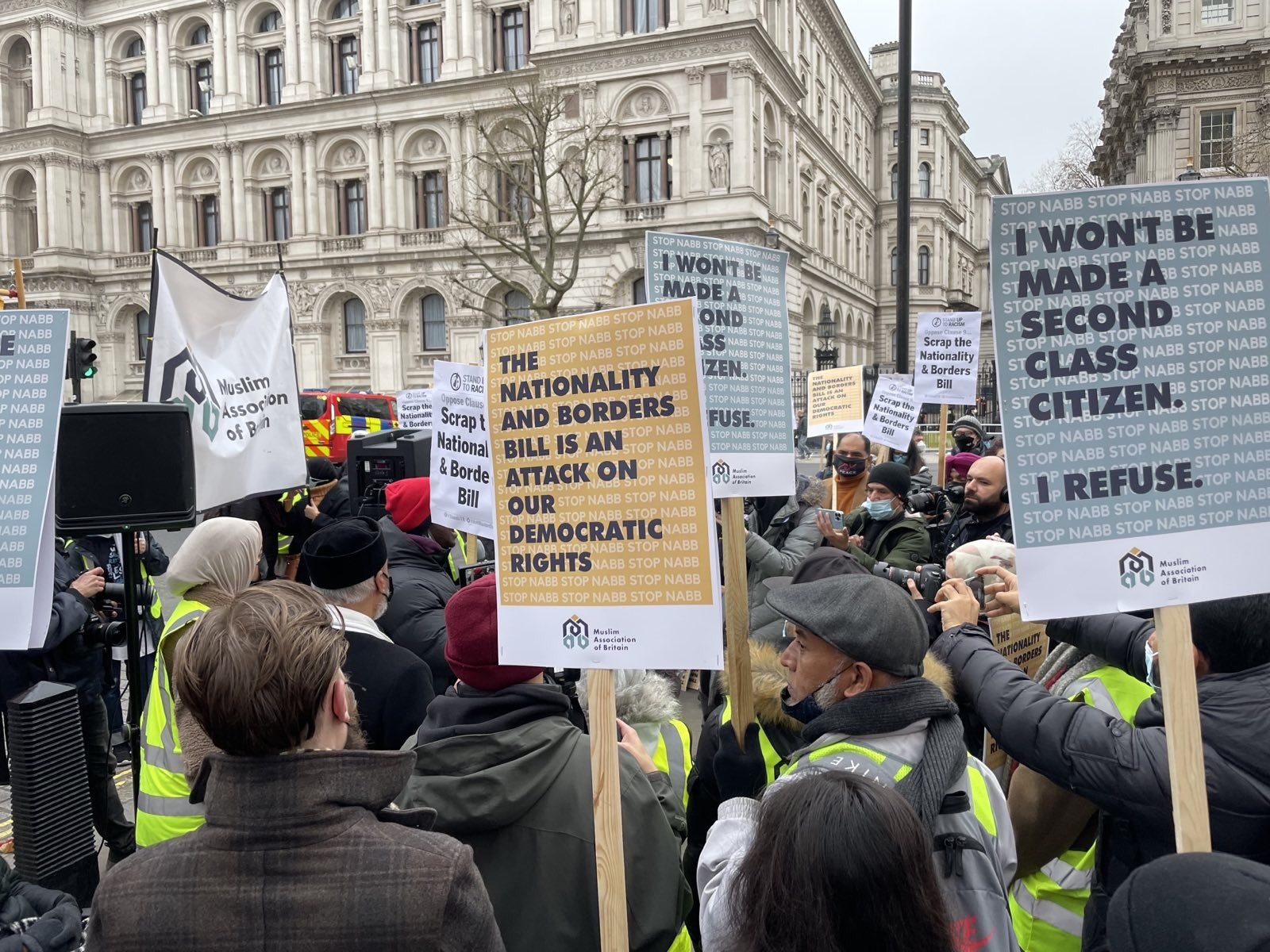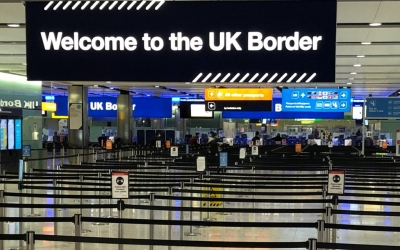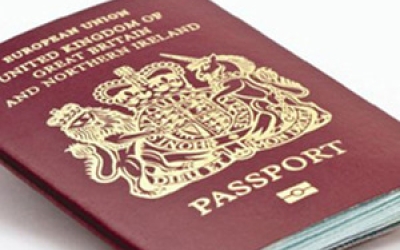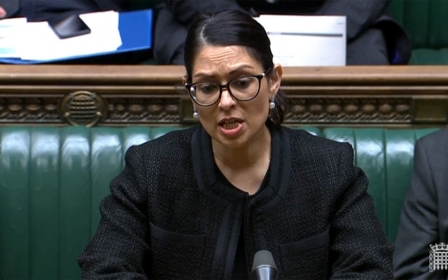Protesters gather in London to oppose plans for removal of citizenship without notice

Dozens of groups representing thousands of people gathered outside Downing Street on Sunday to oppose a controversial new law that could potentially strip British nationality from millions of people without warning, especially those from ethnic minority backgrounds.
Campaign groups have highlighted that the nationality and borders bill will give the UK government the power to strip any British citizen of their nationality without notice if they qualify for citizenship in another country.
Clause nine of the bill exempts the government from giving notice to individuals that their citizenship has been stripped if it is not "reasonably practicable" to do so, or in the interests of national security, diplomatic relations, or the public interest.
Organised by Media Diversified, a group that aims to get more ethnic minorities into the media, the organisation was joined by several other groups outside the prime minister's residence in London, including the Sikh Council UK, Stand up to Racism and the National Education Union.
Yasmine Adam, who works for the Muslim Association of Britain, described the new law as making ethnic minorities "second class citizens" without them realising it.
"By passing this bill, not only does it make us second class citizens, it also takes away our fundamental rights," Adam told Media Diversified.
"Citizenship is not a privilege, it's a right. We are as British as anyone else here."
Mass petition
A petition organised by Media Diversified had already garnered 275,203 signatures at the time of writing, demanding the UK government remove clause nine from the bill.
The proposed change to the current law is sponsored by the UK's Home Secretary Priti Patel. The bill is currently proceeding through the House of Commons but has yet to be considered by the upper house of the UK parliament, the House of Lords, which can propose amendments to legislation.
Analysis by the New Statesman, using data from the UK Office of National Statistics, estimates that the British citizenship of six million people could potentially be taken away from them without warning if the bill passes through both houses.
In 2019, former Home Secretary Sajid Javid used controversial powers to strip the British citizenship of Shamima Begum, a British woman who travelled to join Islamic State in 2015 at the age of 15.
Last year, the Special Immigration Appeals Commission (SIAC) ruled that Javid's decision did not render Begum "stateless" and said she could apply for Bangladeshi citizenship, where her parents are originally from.
The UK and citizenship-stripping powers
+ Show - HideThe UK has been described by researchers as a “global leader in using citizenship deprivation as a counterterrorism measure”.
Historic citizenship-stripping powers targeted at naturalised citizens on disloyalty grounds had largely fallen into disuse prior to 2002, when the government introduced new measures in an attempt to revoke the citizenship of Abu Hamza, an Egyptian-born cleric subsequently convicted of terrorism in the US.
The 2002 legislation allowed for British-born nationals as well as naturalised citizens to lose their nationality rights. Successive governments gradually broadened the scope of the powers so that home secretaries can now deprive anyone of citizenship if they are satisfied that doing so is “conducive to the public good” and would not leave an individual stateless.
No criminal conviction is required. Letters often state that individuals have been assessed as presenting “a risk to the national security of the United Kingdom”.
The government’s use of the powers surged to unprecedented levels in response to the perceived threat posed by British nationals returning from Syria.
Between 2010 and 2015, 33 people were stripped of their citizenship, according to Home Office figures. In 2016, 14 people were deprived, and in 2017 the number jumped to 104.
In 2018, the figure was 21, and in in 2019 - when Shamima Begum was among those targeted - it was 27. It then dropped to ten in 2020 and eight in 2021.
Some subjects of citizenship-stripping orders argue that they have been left effectively stateless, because the government bases its assessment that they are dual nationals on a right of citizenship to a parent’s country of birth, even if they have never taken up that citizenship or even visited the country.
In some cases the Special Immigration Appeals Commission, which rules on citizenship cases, has agreed: it has ruled in favour of British nationals of Bangladeshi descent on the grounds that Bangladesh does not consider them citizens if they have not claimed Bangladeshi nationality before the age of 21.
Human rights organisations and lawyers have compared the powers to “medieval exile and banishment”. Critics also point out that the powers create a two-tier system in which only those deemed to be dual nationals are at risk of losing their British citizenship; a measure that discriminates against naturalised citizens, immigrants and their children.
In 2002, the UK introduced measures that allowed British-born nationals and naturalised citizens to lose their nationality rights. Successive governments gradually broadened the scope of those powers.
Since 2006, the UK home secretary has had the power to strip dual nationals of their British citizenship if doing so is deemed "conducive to the public good".
In 2014, these powers were extended further to foreign-born British citizens without dual nationality, who can be made stateless if they qualify for nationality in another country.
The government's use of the powers then rose in response to the perceived threat posed by British nationals returning from Syria.
Out of 172 people deprived of citizenship between 2010 and 2018, 104 of those cases occurred in 2017, according to Home Office figures.
Earlier this year, Middle East Eye reported on the case of a British man who was able to return to the UK after four years stranded abroad, after the government was found to have wrongly assessed that he was entitled to Bangladeshi citizenship.
Middle East Eye delivers independent and unrivalled coverage and analysis of the Middle East, North Africa and beyond. To learn more about republishing this content and the associated fees, please fill out this form. More about MEE can be found here.






